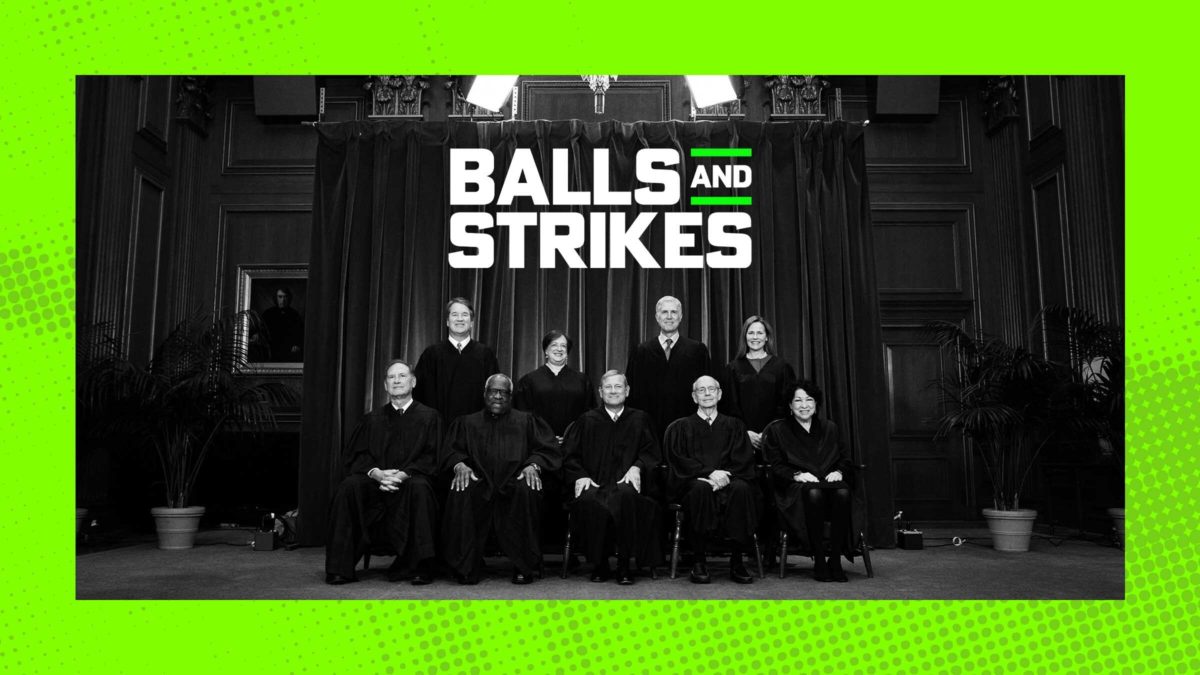The Supreme Court wrapped its term and headed off on summer vacation this week with a pair of opinions in West Virginia v. Environmental Protection Agency and Biden v. Texas. Together, these cases establish that executive agencies CANNOT do anything meaningful about the climate crisis (or anything else the Republican justices don’t care about), but also, that Donald Trump is NOT an emperor-god-king whose trademark brand of zombified xenophobia will dictate U.S. immigration policy forevermore. Incredibly, for anyone to the left of, say, Mitt Romney, the Court’s last day of school falls somewhere on the spectrum between “not bad” and “actually kind of encouraging, if you think about it, I guess.”
West Virginia is a case about the scope of the EPA’s authority to regulate greenhouse gas emissions, which, as you may recall, are in the process of choking the planet to death. Using its authority under the Clean Air Act to set emissions limits using the “best system of emission reduction” available, the EPA under President Barack Obama rolled out a rule known as the Clean Power Plan in 2015. This rule, among other things, required fossil fuels-burning power plants to do their part to reduce emissions by cutting production, investing in renewable energy, or offsetting their pollution via cap-and-trade.
Alas, the Clean Power Plan never took effect: The Supreme Court stayed the rule in 2016, and the Trump administration replaced it with a (much weaker, of course) rule of its own. This rule also never took effect: In January 2021, a federal appeals court decided that Trump’s rule and his rescission of the Clean Power Plan were unlawful, too. When President Joe Biden took office, he quite sensibly concluded that he wanted no part of this mess. His administration is working on its own emissions-related rule, hopeful that it can find some kind of Goldilocks approach to climate regulation that judges won’t immediately stuff in the trash.
The Court’s decision in West Virginia all but guarantees that judges will do exactly that. Writing for the six conservatives, Chief Justice John Roberts concludes that Congress simply could not have intended to grant this much power to the EPA. His support for this assertion is, basically, vibes: that even if the Clean Power Plan is a “system” for reducing emissions under any reasonable definition of the word “system,” surely it isn’t the type of system Congress had in mind when it wrote the Clean Air Act. The text means what it says, in other words, except where Roberts and company think it should mean something else.
The opinion speaks glowingly of the “major questions” doctrine, which purports to require clear evidence of congressional intent when agencies exercise power over issues of “vast economic and political significance,” or that generate “earnest and profound debate,” or that intrude on a “particular domain of state law.” This is a fancy way of saying that going forward, whenever an agency tries to do anything important, only those actions expressly approved by nine Supreme Court justices will pass legal muster. Every time Roberts begins a sentence with “we find” or “we expect,” he is speaking for a very specific “we”: six Republicans for whom the phrase “climate change” is the punchline to their favorite cocktail party jokes.
As usual, the conservatives attempt to justify their position by appealing to democratic principles: If Congress really wants something like cap-and-trade to become law, well, there’s a process for doing that. But as the liberals point out in dissent, the ability to infuse statutes with some flexibility is an essential tool for Congress, because a very important part of Congress’s job is to write laws that are workable both in the present and also in the future. Hamstringing lawmakers by taking away this safety blanket is bad. Making a bunch of unelected judges the arbiters of what rules, as Justice Elena Kagan puts it, count as “too new and too big a deal for Congress to have authorized” is even worse.
That the Court is consolidating power in itself at a moment when reactionaries have a stranglehold on the Court’s power is not a coincidence. As I’ve written before, the point of the conservative legal movement’s push to control the judiciary is to enact an unpopular agenda by recasting it as the objectively correct product of a neutral legal process. West Virginia is shaping up to be among the movement’s most consequential accomplishments, further collapsing the three-ring government structure of Schoolhouse Rock fame into one: A polarized, paralyzed Congress, as everyone including Roberts knows, can’t do anything anymore, which leaves most of the work of policymaking to the executive branch and the modern administrative state. By creating for itself a de facto veto over any policy it doesn’t like, the West Virginia Court has made itself the only branch that matters.
In, uh, brighter news (?), thanks for all your support of Balls & Strikes as we wrap our first full term of covering the Supreme Court. As always, you can find us at ballsandstrikes.org, or follow us on Twitter @ballsstrikes, or get in touch via [email protected]. Thanks for reading.
This Week In Balls & Strikes
What Are Progressive Movement Judges, and Why Aren’t There More Of Them?, Brandon Hasbrouck
The Biden White House has the chance to appoint judges who care about things other than megacorporation free speech rights. Why aren’t they doing so more often?
“Just Vote, Ladies,” Says Supreme Court Working Overtime to Make Voting Harder, Yvette Borja
Why leaving abortion access to the “democratic process” is a slam dunk for the Republican Party’s gerrymandering enthusiasts.
Who Is Brett Kavanaugh Kidding?, Lisa Needham
America’s bro-iest justice has some THOUGHTS about the right to bodily autonomy.
The Supreme Court’s Hottest New Trend Is “Just Making Shit Up”, Yvette Borja
If you’re a conservative justice and the case before you doesn’t give you the chance to do what you want, what do you do? Come up with a different case instead!
This Week In Other Stuff We Appreciated
The Theocrats on the Supreme Court Strike Again, Elie Mystal, The Nation
Conservatives are weaponizing the First Amendment like it’s the Second.
Samuel Alito: The 21st Century Roger Taney, Harold Meyerson, The American Prospect
With apologies to Roger Taney.
America Is Backsliding, and All Of Us Will Pay For It, Timothy Noah, The New Republic
A look at the price tag of the Court’s extremism.
Citizens No More, Tressie McMillan Cottom, The New York Times
“Thanks to a rogue court, women’s lives are now more determined by the accidents of our birth than they were a week ago.”
This Week In Obscure Photos of Supreme Court Justices On Getty Images


